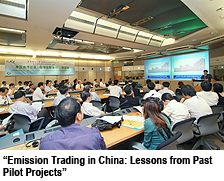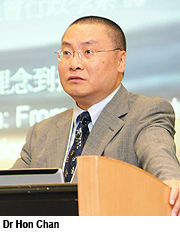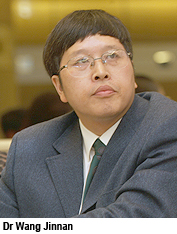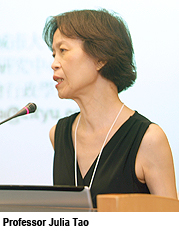CityU hosts Symposium on emission trading to explore environmental governance
With emission trading emerging as a key instrument in the drive to reduce greenhouse gas emissions, the Symposium, held on 30 August, demonstrates CityU’s increasingly proactive role in promoting applied research to address public policy and governance issues, including those of air pollution and cross-border environmental control.
“This event underscores our commitment to discussing policy innovation to achieve more effective governance,” said Dr Chan Hon-suen, Head of the Department of Public and Social Administration.
Representatives from the business sector, political parties, green organizations, professional organizations and the public policy sector plus a number of academics specializing in this field attended the meeting.
Dr Wang Jinnan, Chief Engineer with the Chinese Academy for Environmental Planning, State Environmental Protection Administration, delivered a keynote speech on the nation-wide policy framework for the implementation of an emission trading programme on the mainland.
Another speaker, Mr Esmond Lee, Deputy Director of the Environmental Protection Department, HKSAR, gave a talk entitled “The emission trading pilot scheme for thermal power plants in the Pearl River Delta region”. This scheme is expected to enhance Guangdong - Hong Kong cross-border environmental cooperation.
Three mainland environmental experts presented their perspectives on these issues. Professor Ma Xiaoling of the South China Institute of Environmental Sciences, State Environmental Protection Administration, looked at strengthening Guangdong - Hong Kong cross-border environmental governance in order to realize common objectives of clean air and blue skies in the Pearl River Delta region; Mr Xue Renjie, Deputy Director of the Jiangsu Environmental Protection Bureau, reviewed past emission trading schemes on the mainland; and Dr Zhu Fahua, Deputy President of the State Power Environmental Protection Research Institute, analyzed the prospects and challenges of a nation-wide emission trading programme from a corporate perspective.
Professor Julia Tao Lai Po-wah, Director of GARC, said emission trading schemes have established the concept of using a public resource at a cost. “By allowing participants the flexibility to trade allowances, the overall reductions in emissions are achieved in the most cost-effective way possible,” Professor Tao said.
Emission trading schemes are a measure of applying market-based trading to using a public resource such as the environment. They allow the government to cap the amount of emissions produced, and participating companies are allowed to purchase allowances, which the government allocates them, from the market.



